Answered step by step
Verified Expert Solution
Question
1 Approved Answer
contemporary ethics issues QUESTION 1 Prescriptive Ethics is the study of moral problems which seeks to discover how one ought to act the discipline concerned
contemporary ethics issues 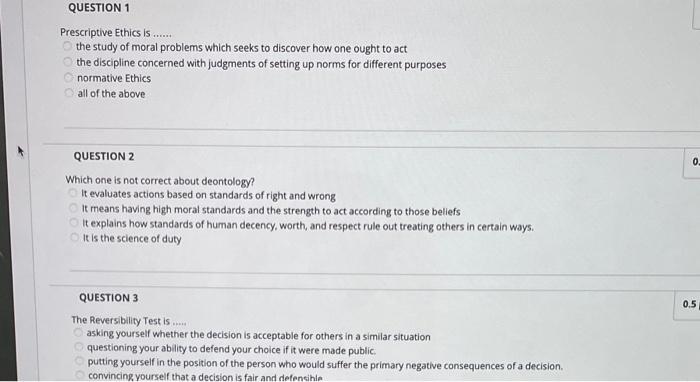
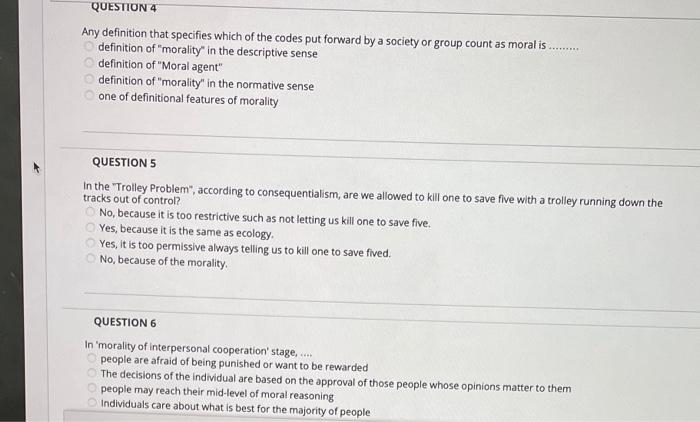
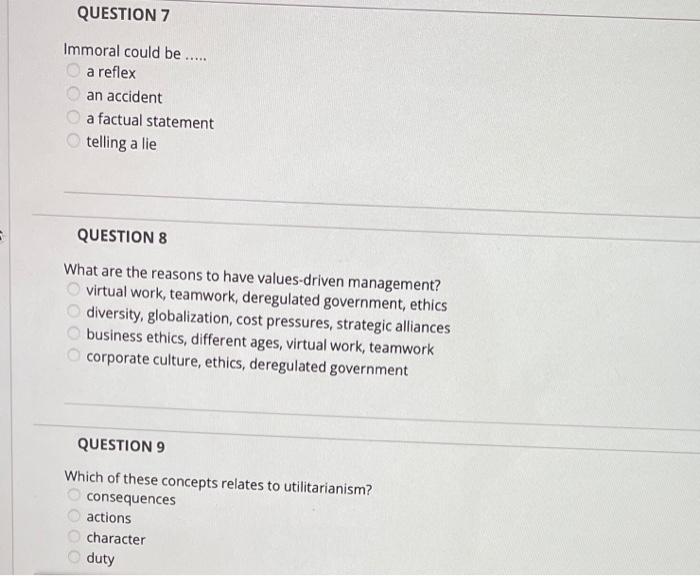
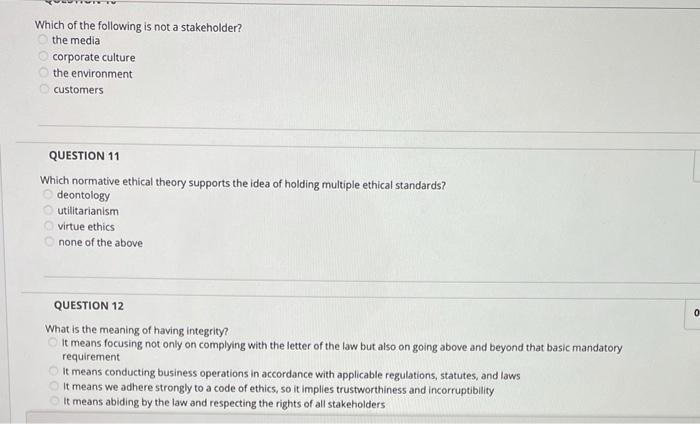
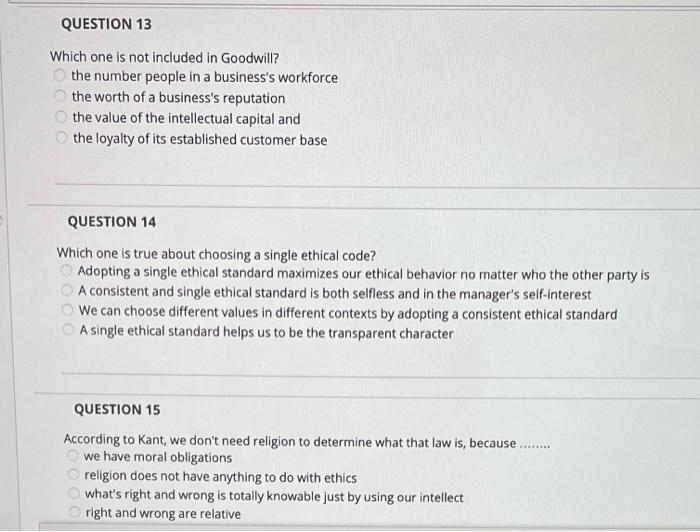
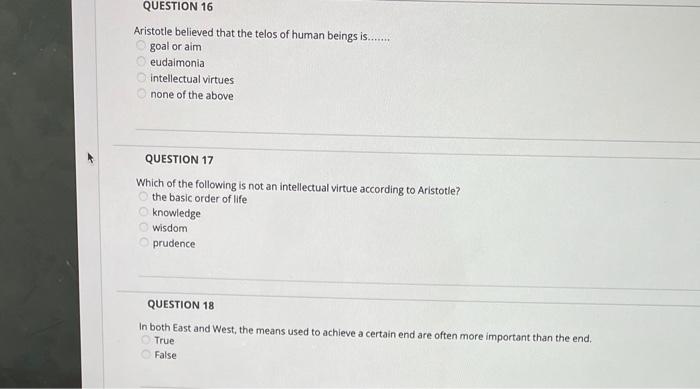
QUESTION 1 Prescriptive Ethics is the study of moral problems which seeks to discover how one ought to act the discipline concerned with judgments of setting up norms for different purposes normative Ethics all of the above 0 QUESTION 2 Which one is not correct about deontology? It evaluates actions based on standards of right and wrong It means having high moral standards and the strength to act according to those beliefs It explains how standards of human decency,worth, and respect rule out treating others in certain ways. It is the science of duty 0.5 QUESTION 3 The Reversibility Test is..... asking yourself whether the decision is acceptable for others in a similar situation questioning your ability to defend your choice if it were made public putting yourself in the position of the person who would suffer the primary negative consequences of a decision. convincing yourself that a decision is fair and defensible QUESTION 4 Any definition that specifies which of the codes put forward by a society or group count as moral is.......... definition of "morality" in the descriptive sense definition of "Moral agent" definition of "morality in the normative sense one of definitional features of morality QUESTION 5 In the "Trolley Problem", according to consequentialism, are we allowed to kill one to save five with a trolley running down the tracks out of control? No, because it is too restrictive such as not letting us kill one to save five. Yes, because it is the same as ecology Yes, it is too permissive always telling us to kill one to save fived, No, because of the morality QUESTION 6 In 'morality of interpersonal cooperation stage, people are afraid of being punished or want to be rewarded The decisions of the individual are based on the approval of those people whose opinions matter to them people may reach their mid-level of moral reasoning Individuals care about what is best for the majority of people QUESTION 7 Immoral could be ..... a reflex an accident a factual statement telling a lie QUESTION 8 What are the reasons to have values-driven management? virtual work, teamwork, deregulated government, ethics diversity, globalization, cost pressures, strategic alliances business ethics, different ages, virtual work, teamwork corporate culture, ethics, deregulated government QUESTION 9 Which of these concepts relates to utilitarianism? consequences actions character duty Which of the following is not a stakeholder? the media corporate culture the environment customers QUESTION 11 Which normative ethical theory supports the idea of holding multiple ethical standards? deontology utilitarianism virtue ethics none of the above 0 QUESTION 12 What is the meaning of having integrity? It means focusing not only on complying with the letter of the law but also on going above and beyond that basic mandatory requirement It means conducting business operations in accordance with applicable regulations, statutes, and laws It means we adhere strongly to a code of ethics, so it Imples trustworthiness and incorruptibility It means abiding by the law and respecting the rights of all stakeholders QUESTION 13 Which one is not included in Goodwill? the number people in a business's workforce the worth of a business's reputation the value of the intellectual capital and the loyalty of its established customer base QUESTION 14 Which one is true about choosing a single ethical code? Adopting a single ethical standard maximizes our ethical behavior no matter who the other party is A consistent and single ethical standard is both selfless and in the manager's self-interest We can choose different values in different contexts by adopting a consistent ethical standard A single ethical standard helps us to be the transparent character QUESTION 15 According to Kant, we don't need religion to determine what that law is, because we have moral obligations religion does not have anything to do with ethics what's right and wrong is totally knowable just by using our intellect right and wrong are relative QUESTION 16 Aristotle believed that the telos of human beings is....... goal or aim eudaimonia intellectual virtues none of the above QUESTION 17 Which of the following is not an intellectual virtue according to Aristotle? the basic order of life knowledge wisdom prudence QUESTION 18 In both East and West, the means used to achieve a certain end are often more important than the end, True False 





Step by Step Solution
There are 3 Steps involved in it
Step: 1

Get Instant Access to Expert-Tailored Solutions
See step-by-step solutions with expert insights and AI powered tools for academic success
Step: 2

Step: 3

Ace Your Homework with AI
Get the answers you need in no time with our AI-driven, step-by-step assistance
Get Started


